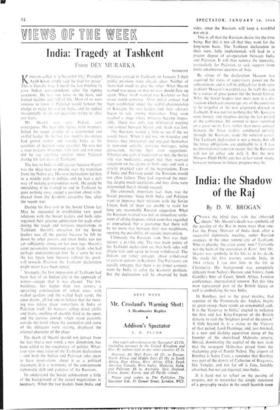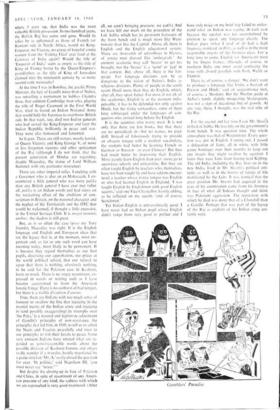India: the Shadow of the Raj
By D. W. BROGAN
y—IONIES the blind fury with the abhorred shears.' Mr. Shastri's death was symbolic of the passing of the Raj in more ways than one. For the Prime Minister of India died, after a successful diplomatic meeting. under Russian auspices, in the once remote city of Tashkent. Who is playing the great game- now? Certainly not the heirs of the operatives in Kim! And Mr. Shastri was symbolic in his life as in his death. He made his first journey outside India in 1964 (where I ran into him in the lift in Claridees). His background was completely different from Nehru's Harrow and Trinity, from Gandhi's Inns of Court, South Africa, London conferences, international renown. Yet this tiny man represented part of the British legacy as well as embodying the new India.
In Bombay, just as the great marina, that superior of the Promenade des Anglais, begins its great sweep, there stands an ornamental arch. It is the 'Gateway to India,' erected to welcome the first and last King-Emperor of the British dynasty to visit the 'brightest jewel of the crown.' A little beyond it, is a statue to the Viceroy of that period, Lord Hardinge, and, just finished, is a new and dashing equestrian statue of the founder of the short-lived Mahratta empire, Shivaji, dominating the capital of the new state that the resurgent Mahrattas prised from the slackening grip of Pandit Nehru. The airport of Bombay is Santa Cruz, a reminder that Bombay was part of the dowry of Catherine of Braganza, like Tangier, and not far off is Goa, forcibly absorbed, but not yet digested, into India.
It is hard not to reflect on the passing of empires, not to remember the simple statement of a geography reader in the small Scottish town where I grew up, that India was the most valuable British possession. In two hundred years, the British Raj has come and gone. Would its relics be as ephemeral as those of French (or Roman) rule in North Africa, would no King- Emperor, no Viceroy, no covey of hopeful young women from the 'Fishing Fleet' ever land at the Gateway of India again? Would the title of 'Emperor of India' seem as empty as the title of King of France borne by the Queen-Empress's grandfather, as the title of King of Jerusalem claimed into the nineteenth century by so many second-rank monarchs?
At the time I was in Bombay, the pacific Prime Minister, the heir of Gandhi more than of Nehru, was unveiling a monument to Subhas Chandra Bose, that eminent Cambridge man who, playing the role of Roger Casement in the First World War, tried to found an Indian National Army that would help the Japanese to overthrow British rule. In that week, too, died two Indian generals who had served the King-Emperor and later the Indian Republic brilliantly in peace and war. They were also honoured and lamented.
So it goes. There are still statues, mostly horrid, of Queen Victoria and King George V, of more or less forgotten viceroys and other spokesmen of the Raj (although I do not think that the present generation of Hindus are regarding, despite Macaulay, the statue of Lord William Bentinek with any particular reverence).
There are other imperial relics. Lunching with a Governor who is also an ex-Maharajah, I en- countered a Sikh general who was more pukka than any British general I have ever met (after all, pukka is an Indian word) and had views on the weakening effect of the abolition of con- scription in Britain, on the national character and the neglect of the Territorials and the OTC that would be welcomed, if thought a little excessive, in the United Services Club. It is magni nominis umbra: the shadow is still great.
But, as is so often the case (pace my Tory friends), Macaulay was right. It is the English language and English and European ideas that are the legacy that is, at the moment, most im- portant and, as far as any such word can have meaning today, most likely to be permanent. It is because they regard themselves as our best pupils, deserving our approbation, our prizes at the world political school, that our refusal to agree that there is nothing, absolutely nothing, to be said for the Pakistan case in Kashmir, hurts so much. There is no angry resentment, ex- pressed in words or writing such as I have become accustomed to from the American lunatic fringe. There is no outburst of bad temper, but there is a visible deception d'amour.
True, there are Indians with too much sense of humour to swallow the line that rejoicing in the martial merits of the Indian army and rejoicing in (and possibly exaggerating) its triumphs over 'the Paks,' is a natural and legitimate adjustment of Gandhi's principles of non-resistance, the principles that led him, in 1940, to tell us to admit the Nazis and Fascists peacefully and trust to our principles to win their hearts to peace. Some very eminent Indians have uttered what arc re- garded as semi-treasonable words about the possible division of Kashmir-Jammu and others really wonder if a transfer, hastily negotiated by a panic-stricken `Mr. A,' really closed the question for ever. 'In politics,' said Napoleon III must never say "never."'
But despite the closing-up in face of Pakistan and China, in spite of resentment of any Ameri- can pressure of any kind, the sadness with which we are reproached is very good-mannered. (After
all, we aren't bringing pressure; we can't.) And we have left our mark on the procedure of the Lok Sabha which has its persistent harassers of the front bench and is much more like West- minster than like the Capitol. Above all, there is English and the English educational system. There are thousands of schoolboys in blazers, of young men dressed like 'undergrads.' An eminent academic may call 'bearer' to get tea brought, but the 'bearer' is a 'scout' or 'gyp' in that context. But, above all, there is the lan- guage. For language divisions can be as dangerous to the vision of Nehru's India as religious divisions. Plenty of people in the south resent Hindi more than they do English, which, after all, they speak better. For most, if not all, of the academics, English is at the moment indis- pensable; it has to be defended not only against Hindi, but the rising vernaculars, some of them long submerged under the languages of con- querors who arrived long before the English.
It is the scientists who worry most. It is not only that there are few books, but that there are no periodicals in—but no names, no pack drill. Instead of laboriously trying to provide an obscure tongue with a modern vocabulary, the students had better be learning French or German or Russian--or even Chinese! But they had much better be improving their English. More people learn English than ever: more go to secondary schools and universities. But they are often taught English by teachers who, themselves, have not been taught by and have seldom encoun- tered a teacher whose native tome was English or who had learned English in England. `I was taught English by Englishmen with good English accents,' said one Vice-Chancellor, hastily adding, as he reflected on my accent, 'and, of course, Scotchmen.'
Yet Indian English is extraordinarily good. I have never had an Indian pupil whose English didn't range from very good to perfect and I
have only twice on my brief trip failed to under- stand what an Indian was saying; in each case because the speaker was too overwhelmed by emotion to speak any language clearly. The Indian press (what I read of it) had a high linguistic standard; in Blitz, as well as in the more responsible organs of the business class. For a long time to come, English (or American) must be the lingua franca, although, of course, in northern India one must avoid confusing the issue with absurd parallels with Irish, Welsh or Flemish.
There is, of course, a danger. 'We don't want to produce a language like Urdu, a bastard of Persian and Hindi,' said an acquaintance (not, of course. a Moslem). But the Muslim guide at Akbar's tomb, slightly misquoting Shakespeare, was not a sign of decadence but of growth. At any rate, there, I thought, was the real relic of the Raj.
For the second and last time I saw Mr. Shast—ri in the Lok Sabha. He was tiny on the government's front bench. It was question time. The whole atmosphere was that of Westminster. Every ques- tion was put in English. Coming out, I passed a delegation of Jains, all in white, with little gauze bandages over their mouths to keep out any insects they might swallow by accident. I knew they were Jains from having read Kipling. The old India, including the Raj, lives on in the new India, lived in Mr. Shastris political atti- tudes as well as in the horror of taking of life manifested by the Jains. It was ironical that the great position Mr. Shastri had acquired in the eyes of his countrymen came from his firmness in face of what all Indians thought and think was Pakistani aggression. The reputation with which he died was more that of a Churchill than a Gandhi. Perhaps that was part of the legacy of the Raj as exploits of the Indian army cer- tainly were.
Gamblers' Paradise



































 Previous page
Previous page